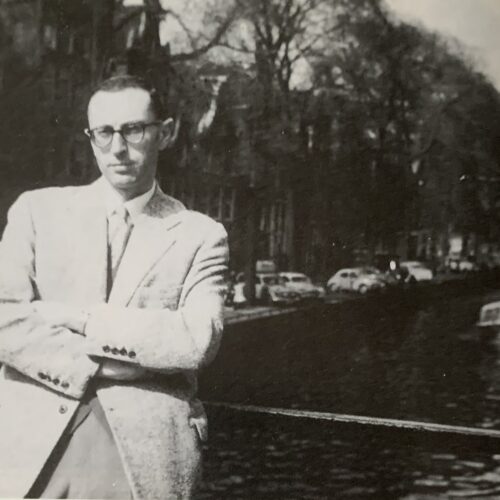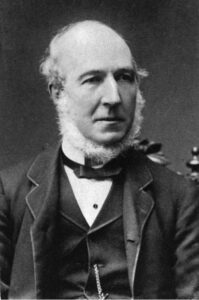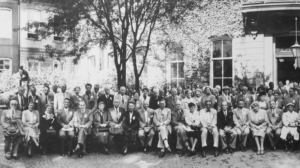


‘Being Rational About Being Gay’ was a talk given by activist Antony Grey (Anthony Edgar Gartside Wright) for the Gay Humanist Group (now LGBT Humanists) on 13 June 1980 at Conway Hall. One of the most important British gay rights campaigners of the 20th century, Grey was active in the Homosexual Law Reform Society and the Albany Trust, as well as with the National Council for Civil Liberties and the British Association for Counselling and Psychotherapy. A writer and advocate, he used this lecture to forefront his personal commitment to both his activism and his humanist principles.
I CHOSE this title because being rational and being gay are both very important things for me as a person. I can’t hope to say everything I want to about either topic tonight; but what I want to do is to talk first about the importance of being rational – because not even all humanists or all non-believers always recognise how essential that is, especially in the present state of the world; then to look briefly at the commonest varieties of irrational attitudes towards gayness and gay people which are manifested by all too many who are gay as well as by those who aren’t; and finally to suggest some ways in which the Gay Humanist Group, who I understand are dedicated to the propositions that reasonableness and gayness are both positive factors in healthy human living, could help to spread some enlightenment around.
NATURAL
First of all, I want to say that being gay, for me, has never been “a problem”. I am perhaps fortunate in never having experienced the phase of acute self-doubt, or even self-disgust, which so many young gay people pass through about their sexuality and which some never entirely grow out of, even as adults. For me, being attracted sexually to other boys, and not to girls, was always so natural & part of my being from the time I first became aware of it that I couldn’t understand how anybody else could doubt its validity even if they didn’t share the experience, So I never made that liberating lurch from self-hate to public celebration of my gayness which I know has been such a positive event in a lot of gay peoples’ lives. Perhaps I missed something – but I don’t regret having missed the self-hating bit.
DETERMINATION
I’m grateful for being gay because it has made me much more aware of other peoples’ suffering and I am far less complacent about that than I otherwise might be.
What did happen to me was a determination, ever since I was very young, to fight the injustice, prejudice and discrimination which society meted out to homosexual people. And this, of course, led me on to a recognition of many other injustices in society which also needed to be fought. I’m grateful for being gay because it has made me much more aware of other peoples’ suffering and I am far less complacent about that than I otherwise might be.
During the time that I was Secretary of the Homosexual Law Reform Society I made a point, while fighting a single-issue campaign to get the Wolfenden Report’s recommendations made law, of doing as much as I could in other ways by belonging actively to bodies like the National Council for Civil Liberties and the Defence of Literature and the Arts Society, which was how I first came into contact with the humanist movement through meeting Barbara Smoker, David Tribe and Bill McIlroy.
…belonging actively to bodies like the National Council for Civil Liberties and the Defence of Literature and the Arts Society… was how I first came into contact with the humanist movement through meeting Barbara Smoker, David Tribe and Bill McIlroy.
INSEPARABLE
It became increasingly apparent to ae during the 1960s, and is certainly crystal clear now, that the basic issues of human rights, civil liberties, freedom to publish and sexual freedom are inseparable and have to be seen as a whole. Certainly our most vociferous enemies see them that way – they’re against the lot! What concerns me increasingly today is the sort of society I’m going to be living in in 1990 and 2000, if I’m still here then. I passionately want it to be a free society. So, I believe, do most other Britons, of whatever political persuasion. So I’m not quite so worried about the lurch towards authoritarianism as some people are (though I am worried by it), my worries being more about the repressive resources that modern technology is providing the forces of so-called “law and order” with than because I fear deliberately malignant intentions on the Part of the majority of ay fellow-citizens.
REASONABLE
If we have to choose between believing that all human beings have potential for good and that most of them recognise that goodness and happiness are connected in ways which have nothing to do with any supernatural power, or else that people are born with a natural inclination to be evil unless they are ‘saved’ by religion, I know that the first seems most sensible to me.
And this is where the importance of being reasonable comes in. If we are reasonable, if we are rationalists, we make certain assumptions about human nature. Everyone, in fact, does this whether they are aware of it or not. One of the main reasons why I am not a Christian is because, quite apart from my scepticism as to the existence of the kind of God they claim to believe in, I do not share their assumptions about human nature. The belief that all human beings are born radically evil because of original sin, and are only endowed with some redeeming good qualities through belief in an incredible creed and acceptance of a personal Saviour who was God made man is one which I cannot accept because it is contrary to the evidence. Goodness is not confined to believing Christians; nor are such people more immune to evil behaviour than anyone else. The belief that the contrary is so is perverse and irrational and flies in the face of history. If we have to choose between believing that all human beings have potential for good and that most of them recognise that goodness and happiness are connected in ways which have nothing to do with any supernatural power, or else that people are born with a natural inclination to be evil unless they are ‘saved’ by religion, I know that the first seems most sensible to me. So I am an optimist about humanity – though not, I hope, a naïve one. To believe in the humaneness of humanity is not to deny that there is evil in human relationships, or that some individuals can be very evil intend.
ALARMING
A lot of the trouble lies in our propensity to project negative concepts onto those we dislike or disagree with, and then to lump them together into a faceless group and dehumanise them: “All Jews are… all blacks are… all gays are…“ Yes, and “all Christians are…” too.
Yet there was never a time when rationality, and the search for reasonable solutions to social ills, based upon goodwill, logical thought and scientifically assessed knowledge, was more urgently necessary.
This is what seems to be happening, to an increasing extent, in our public life. Yet there was never a time when rationality, and the search for reasonable solutions to social ills, based upon goodwill, logical thought and scientifically assessed knowledge, was more urgently necessary. A most alarming symptom of today’s society is the spread of irrationalism and the amount of attention paid to the views of people who are in some respects at least cranky and even quite simply barmy. For example, our old friend Mary Whitehouse doesn’t accept Darwin’s theory of evolution because it contradicts the book of Genesis. Yet an increasing number of people seen to accept her as a serious social critic! She and the bunch of rabid evangelical biblical fundamentalists who are increasingly permitted by the Churches to masquerade as the spokespersons of “Christian morality” are quite incapable of distinguishing truth from falsehood – and I sometimes suspect that they aren’t concerned to make any such distinction, because it would be so inconvenient for them. They remind me of some remarks by Andre Gide in his book “The Coiners”. He said:
“The deeper the soul plunges into religious devotion, the more it loses all desire, all love for reality….The dazzling light of their faith blinds them to the surrounding world and to their own selves. As for me, who cares for nothing so much as to see the world and myself clearly, I am amazed at the coils of falsehood in which devout persons take delight.”
LIES
Irrationality about sex is even more pervasive than irrationality about most other things. I suppose it is inevitable that something so bound up with emotion should invite a rush of blood to the head (if to nowhere else).
Hard on the heels of Whitehouse’s still unapologised for denunciation of the Albany Trust for its – totally fictitious, need I say? – “promotion” of paedophilia, we now have Mrs Valerie Riches of the grotesquely named ‘Responsible Society’ stomping the country accusing the Family Planning Association of “educating children in promiscuity”. These people obviously have three patron Saint Josephs – Goebbels, McCarthy and Stalin: and they act on the well-tried principle that however big the lie, if you tell it often enough some people are bound to believe it. They obviously don’t know A. E. Housman’s aphorism that “Accuracy is a duty and not a virtue”. Even if they do regard it as a virtue, they make absolutely no attempt whatsoever to be virtuous!
Irrationality about sex is even more pervasive than irrationality about most other things. I suppose it is inevitable that something so bound up with emotion should invite a rush of blood to the head (if to nowhere else). In the preface, written in 1899, to the first edition of Part I of his “Studies in the Psychology of Sex”, Havelock Ellis says:
“It may safely be said that in no other field of human activity is so vast an amount of strenuous didactic morality founded on so slender a basis of facts. In most other departments of life we at least make a pretence of learning before we presume to teach; in the field of sex we content ourselves with the smallest and vaguest minimum of information, often ostentatiously second-hand, usually unreliable.”
And a more modern commentator, Kinsey’s colleague Dr. Wardell Pomeroy, has said:
“There is probably more nonsense written about homosexuality, more unwarranted fear of it, and less understanding of it than of any other area of human sexuality.”
MYTHS
I had hoped that some of the sillier myths about homosexuality which were common coin in the 1950s and ’60s would have been dispelled by now. However, most of them are sadly still alive and seemingly quite well.
I had hoped that some of the sillier myths about homosexuality which were common coin in the 1950s and ’60s would have been dispelled by now. However, most of them are sadly still alive and seemingly quite well; so here’s a check-list together with some of the more obvious responses:
It’s unnatural. (It occurs in nature. What about shaving, wearing clothes, eating cooked food? If all of these are “unnatural”, so what?)
It’s sick. (This has been endlessly disposed of, but people go on and on saying it. Let me repeat: numerous psychological researches have shown no statistically significant differences between the psychological health and successful social functioning of homosexual and heterosexual people. There is no more point in asking what makes anyone homosexual than in asking what makes anyone heterosexual, Anyway, we’re all potentially bisexual. An experienced psychotherapist, Kevin O’Dowd, has said: “Research into ‘causes’ and ‘cures’ of homosexuality is a complete waste of time and money. Why does this particular form of sexual activity make such an assault upon other peoples’ sensitivities?)
It’s sinful. (I leave this one to the Christians, for whom sin and sexual pleasure commonly seem synonymous. In a way I’m sorry for the poor Gay Christians, beating their heads against the brick wall of centuries’ old tradition and prejudice. In another way I feel quite inpatient with them because they are self-oppressive Uncle Toms and Aunt Sallies. As Michael De-la-Noy once said to ne, you need to be schizophrenic to be gay and a Christian.)
There’s still a long way to go before most people will realise that the law’s legitimate place in regard to sexual morality is minimal.
It’s criminal. (There’s still a long way to go before most people will realise that the law’s legitimate place in regard to sexual morality is minimal. The law should do three things, and three things only. It should punish assaults; punish public behaviour that is genuinely offensive to others; and protect the immature or inadequate from predatory sexual exploitation. Apart from these, every limit which the law places upon peoples’ freedom to choose how they behave sexually diminishes their responsibility and is therefore ethically bad.)
Gays are a danger to children. (With the John Saunders case, we now have the extraordinary situation that an official tribunal has given a binding ruling that, even if this particular prejudice is totally without foundation, the mere fact that enough people believe it makes it a “reasonable” cause for dismissal from employment. If ever there was a wilful perversion of the concept of “reasonableness”, this is it; and it is greatly to be hoped that enough MPs will be outraged by such idiocy that some steps can be taken soon towards anti-discriminatory legislation.
Gays are all like the comic stereotypes. (So people can say “I’ve never met one in my life”)
Irrational Gay responses: “I must be vile/sick/perverted/criminal/sinful. So must my sexual partners.”
“I can’t be gay – I’m not like Larry Grayson/Danny La Rue etc.”
“Gay is better”
“Passing is safer” (but the double life isn’t)
“I must stay within my limits” (ageism, fetishism, fantasy, S-M etc.)
LIBERATION
We need to liberate ourselves – not just as a political act, but much more significantly, as human beings… In the type of humanistic counselling work that I’m increasingly involved in these days a lot of store is placed on “authenticity” as a valuable component of healthy human functioning.
We need to liberate ourselves – not just as a political act, but much more significantly, as human beings. This is perhaps even more important for gay people than for others, just because of all the negative bilge we’ve had dumped on us and are still getting. In the type of humanistic counselling work that I’m increasingly involved in these days a lot of store is placed on “authenticity” as a valuable component of healthy human functioning. Genuineness isn’t always easy to define: but I believe that most of us do in fact know in our gut when we, and other people, are being genuine and when we’re being phoney.
My own quite futile efforts to establish some straightforward, mutually sincere dialogue with various characters associated with the Festival of Light and similar bodies have led me to the inescapable conclusion that straightforward, actually sincere dialogue is not their stock-in-trade.
Not all phoneyness is deliberate – I’m willing to take at any rate some of what the Bible-bashers say about “truth” and “love” as being sincerely meant, but the hash they make of their relationships with others on a human level speaks more loudly than such mere words. My own quite futile efforts to establish some straightforward, mutually sincere dialogue with various characters associated with the Festival of Light and similar bodies have led me to the inescapable conclusion that straightforward, actually sincere dialogue is not their stock-in-trade.
CAMPAIGNING
Constantly having to combat irrational and dangerous thinking is strenuous and sometimes tedious, but not necessarily boring. It can be fun.
Constantly having to combat irrational and dangerous thinking is strenuous and sometimes tedious, but not necessarily boring. It can be fun. And as no-one else is doing it as consistently and effectively as is necessary, I hope that GHG will concentrate on a demolition job of much of the silly rubbish that is still spouted about homosexuality. To spur us on, here’s a quotation from an utterly unimpeachable source:
“It’s the uniqueness of each individual that contributes to the variety of life. Free choice is ultimately what life is about, what ethics is about. The whole of the case for freedom is a moral case because it involves choice. Do away with choice and you do away with human dignity. That is why I hate all forms of political extremism… We seek to promote, not destroy, the uniqueness of the individual”.
Who said that? Why, the Leaderine, the Blessed Margaret Thatcher herself. But for my last word, I quote a famous American civil libertarian lawyer, the late Morris Ernst, who wrote in 1936:
“When countries go to the right politically, women go back into the kitchen, books are burned and taboos fence off new frontiers against human adventure.”
Perhaps they’re both right, in their different ways. Or is that unreasonable?
Talk given on 13 June 1980. At the Conway Hall, London.
PUBLISHED BY THE GAY HUMANIST GROUP,
45 TELFORD AVE., LONDON SW2 4XL

While there is much that we do not know, humans are responsible for what we are or will become. No […]

Richard Congreve was a devoted follower of Auguste Comte, whose positivist philosophies and ‘Religion of Humanity’ inspired Congreve to open […]

Humanists International was formed in 1952 as the International Humanist and Ethical Union (IHEU): a federation of the American Ethical […]

To all those who have established and who are maintaining the right to refuse to kill. Their foresight and courage […]